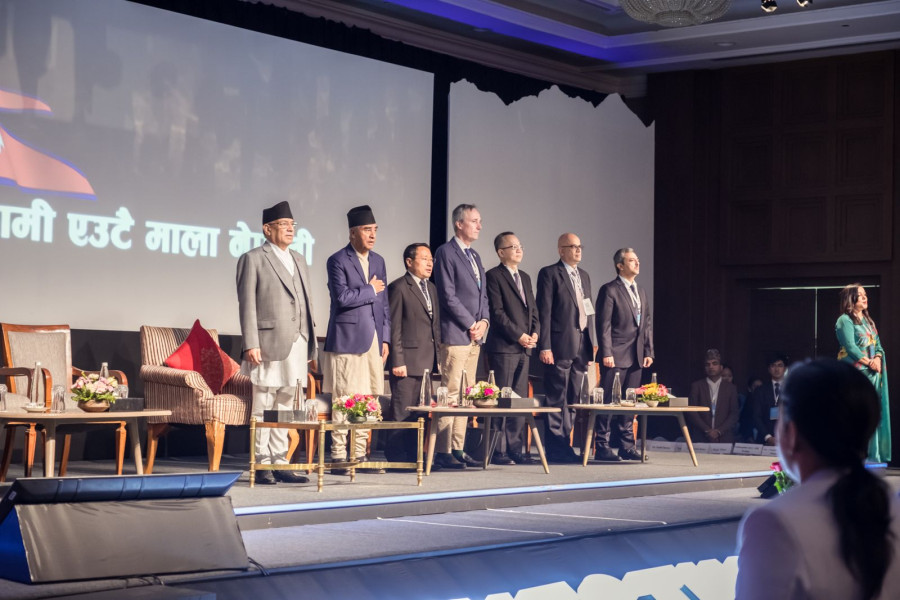National
Ruling and opposition parties close ranks to assure investors
Leaders stress that political instability is no threat to investments as policy stability creates an investor-friendly climate.
Post Report
Politicians on either side of the isle tried to assure potential investors with one voice on Sunday of the safety and return on their investments in Nepal as the government kicked off a two-day Investment Summit.
Leader of the main opposition Nepali Congress, Sher Bahadur Deuba, supported Prime Minister Pushpa Kamal Dahal's statement before foreign delegates that Nepal is an investment-friendly country.
Speaking at the opening session of the third Investment Summit in Kathmandu on Sunday, Prime Minister Dahal, who chairs the CPN (Maoist Centre), and Congress President Deuba tried to send a message across that the country’s political instability won’t impact their investments. Political instability is often blamed for the lack of foreign direct investment (FDI) in Nepal but the leaders stressed that policy stability ensures a suitable investment climate.
During his speech at the summit, Nepal's prime minister, who adheres to a communist ideology, reassured investors of the government's liberal investment policies. This was a considerate move on the part of the prime minister for Rameshore Khanal, a former finance secretary.
“Not only the prime minister and the opposition leader, but leaders of major parties who spoke at the event also vowed to maintain continuity of policy despite changes in the government,” Khanal told the Post. “An unstable political situation is often denounced when it comes to the lack of foreign investment in our country, but leaders have tried to reassure the investors of the continuity of the policy despite the changes in government.”
Leaders, ranging from the ruling coalition to the opposition party, who spoke on the occasion assured of policy continuity and urged investors to invest in Nepal. “The leaders tried to assure investors that they won’t face any economic backlash should they invest in Nepal,” Khanal said.
The Congress-Maoist Centre alliance governed the country until March 4, before Maoist Centre chair Dahal ditched the Congress and took UML on board. The third Nepal Investment Summit, announced by the Congress-Maoist government in November last year, was continued by the UML-Maoist Centre government.
Addressing the inaugural session of the summit, Congress President Deuba also said that all major parties of Nepal are committed to uniting to promote foreign investment and have consensus on major investment issues of the country.
Deuba presented Nepal as a country with a great potential for development but also acknowledged that it lacks sufficient capital and appropriate technology to achieve the benefits of development. Reiterating Nepal as an attractive investment destination, Deuba appealed to foreigners to invest here.
“Nepal is willing to enter into bilateral investment protection agreements with various countries to promote Nepal as an attractive investment destination,” Deuba said.
“International and domestic investors can leave a transformative impact on major sectors such as agriculture, tourism, infrastructure development, mining and minerals, hydropower and information technology.”
Prime Minister Dahal stressed that Nepal is a suitable destination for investment and called upon investors to take advantage of this opportunity. Expressing his government’s commitment to liberal policies, he spoke of efforts made to build an investment-friendly climate.
The prime minister said that Nepal was moving steadily towards creating a friendly environment for investors, industrialists, and entrepreneurs. As part of the effort, eight laws related to business and investment have been amended. The government revised some crucial laws related to investment through an ordinance.
President Ramchandra Paudel on Sunday issued the ordinance amending some Nepal acts related to investment facilitation. The President issued the ordinance on the recommendation of the Council of Ministers in accordance with Article 114 (1) of the Constitution of Nepal.
A day before the third Nepal Investment Summit, the main opposition Congress had expressed its serious reservations over the government’s approach to amending important laws through ordinance. However, the Congress reservation over the ordinance did not reflect in the summit hall. The remarks made by Congress leader Deuba and Prakash Sharan Mahat, who was the finance minister when the summit was announced, also suggest that.
Internally, the political parties of Nepal might have differing opinions on various things, but the diversity of political views won’t affect foreign investments in Nepal, Mahat said.
Yubaraj Khatiwada, another former finance minister and UML leader, and Swarnim Wagle, vice-chair of Rastriya Swatantra Party and an economist, also expressed views supportive of investments.
Before this, Nepal had hosted two Investment Summits back in 2017 and 2019.




 18.12°C Kathmandu
18.12°C Kathmandu













